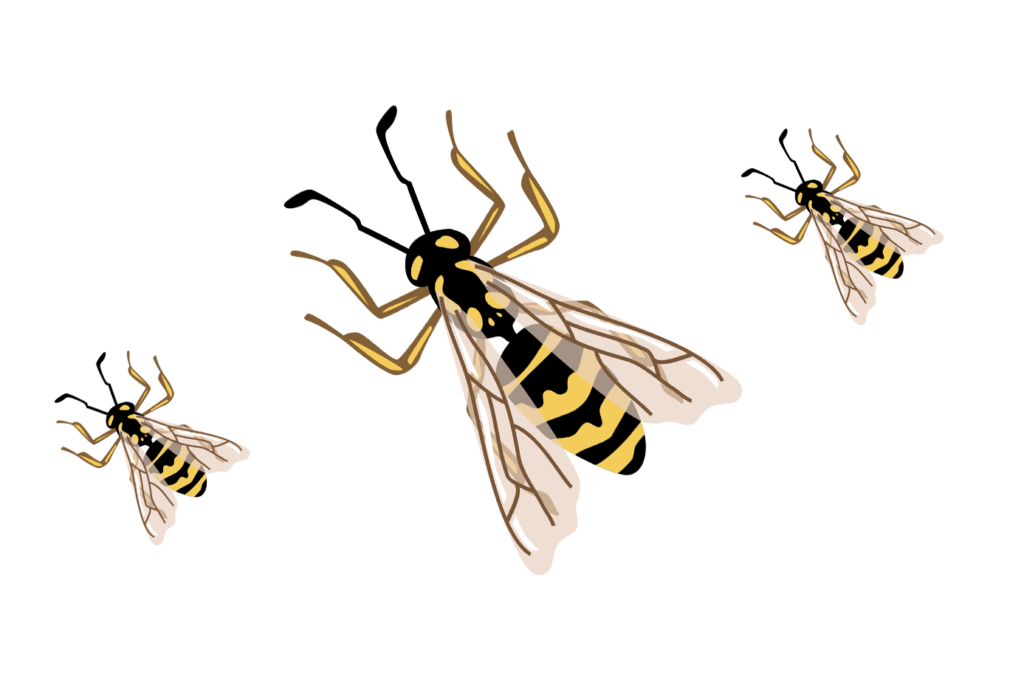Stinging Insect Control
Safe removal of bees and wasps
with respect for pollinators and people.
For the Fastest Response Text Us – 910-709-5214
and let us know how we can help!

Our Eco-Friendly Approach
to Stinging Insect Removal
Don’t risk a sting—especially if you have allergies or young children. Let Eco Man Pest Solutions provide fast, eco-conscious removal and long-term prevention for your property. Call now or request a free online quote.
- Targeted Nest Removal – We remove nests from eaves, attics, trees, sheds, playgrounds, and even underground.
- Seasonal Prevention Treatments – We apply perimeter and entry-point deterrents to keep insects from rebuilding.
- Targeted Yard & Perimeter Sprays
Book a Stinging Insect Solution
How We Get Rid of Stinging Insects
Step 1: Locate the Nest
We perform a full property inspection to identify active nests, scout locations, and stinging insect traffic zones. We also assess for potential future nesting spots.
Step 2: Eco-Safe Treatment
We use plant-powered products to treat the nest directly, knock back the colony, and ensure full neutralization — all without endangering your pets, kids, or pollinators.
Step 3: Prevent Future Nesting
We offer natural deterrent sprays and smart prevention strategies to discourage re-nesting in vulnerable areas like rooflines, sheds, and decks.
Eco Man Stinging Insects Removal Testimonials
The Eco Man Stinging Insect Control Process
Wasps, hornets, yellowjackets, and other stinging insects can turn outdoor spaces into danger zones—especially for children, pets, or anyone allergic to their venom. At Eco Man Pest Solutions, we provide fast, eco-conscious stinging insect control for homes and businesses across Durham, Raleigh, Chapel Hill, and the surrounding Research Triangle.
Our goal isn’t just to remove visible nests—we target the root of the problem, treating and preventing future infestations without harmful chemicals that can affect pollinators like honeybees.
Common Stinging Insects in the Triangle
- Paper Wasps – Build umbrella-shaped nests under eaves and overhangs.
- Bald-Faced Hornets – Aggressive defenders of large aerial nests.
- Yellowjackets – Often nest underground or in wall voids; aggressive in late summer.
- Mud Daubers – Less aggressive, but unsightly and prone to nesting in garages or sheds.
The Eco Man Stinging Insect Control Process
- Inspection – We locate the nest, identify the insect, and assess the threat level.
- Eco-Safe Treatment – We apply targeted, low-toxicity solutions to eliminate the colony.
- Nest Removal – We physically remove accessible nests to prevent re-use.
- Prevention Plan – We seal entry points, offer landscaping recommendations, and schedule follow-ups.
Helpful DIY, Tips & Tricks for Pests
Why Wasps Are Kevin’s #1 Enemy
No pest gets under Kevin the Eco Man’s skin like wasps. Aggressive, territorial, and dangerous around kids and pets, they’re public enemy #1 in his book.
